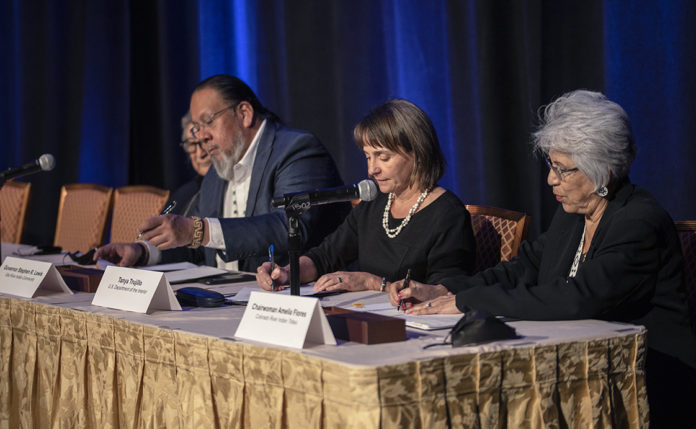
WASHINGTON, D.C. – Assistant Secretary for Water and Science Tanya Trujillo announced several actions during the Colorado River Water Users Association’s annual conference that will advance the Department of the Interior’s efforts to mitigate the impacts of drought and assist the public, tribes and adjoining communities through investments with partners in the Colorado River Basin. The initiatives announced supplement the significant investments in the Bipartisan Infrastructure Law for drought resilience measures.
“There is an urgent need to minimize the impacts of drought and develop a long-term plan to facilitate conservation and economic growth, because drought doesn’t impact just one community – it affects all of us, from farmers and ranchers to city dwellers and tribes,” said Assistant Secretary Trujillo. “To address this growing crisis, the Interior Department is helping lead the Biden-Harris administration’s all-of-government approach to drought mitigation by coordinating with partners across the federal government, providing assistance to impacted communities, and developing long-term solutions to climate change.”
During the conference, Assistant Secretary Trujillo and other water management officials highlighted the broad range of essential partnerships to address the impacts of climate change, including binational efforts with the Republic of Mexico under the leadership of the International Boundary and Water Commission. These announcements came as officials released the latest projections on this winter’s snowpack and runoff, which point to worsening drought conditions.
Last week, the Interior Department and water agencies across Arizona, California and Nevada signed a Memorandum of Agreement to invest up to $200 million in projects over the next two years to reduce the risk of Lake Mead falling to critically low elevations in the months and years ahead. To supplement these investments, Interior Department officials also signed important water conservation agreements with the Colorado River Indian Tribes and the Gila River Indian Community designed to help stabilize the elevation of Lake Mead.
To underscore the Department’s commitment to engaging with tribal communities, Secretary Deb Haaland will host a listening session with tribal leaders from across the Colorado River Basin in early 2022. This listening session will build off the broad ongoing coordination with tribal leaders in the Colorado River Basin and will be followed by government-to-government consultations over the next several years.














































